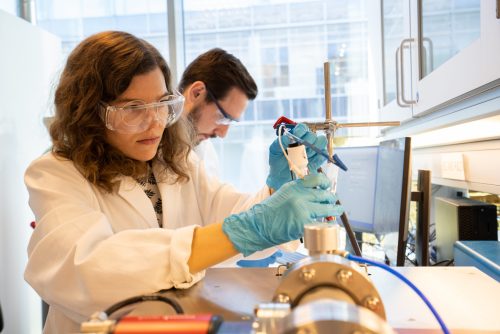There are so many challenges in battery Research & Development, R&D, but we have decided to name some of the key significant challenges that researchers and companies face in their quest to produce efficient, reliable and safer batteries.
These challenges are correlational to the ability of the EC-MS to provide solutions within these areas:
Battery Capacity: This refers to the amount of energy a battery can store and deliver. Increasing capacity is a central goal in battery research because it directly impacts a battery’s energy density and the runtime of devices it powers. To improve the battery capacity, researchers usually face challenges like developing batteries with higher energy densities to store more energy in a smaller and lighter package, finding materials that can store more ions and electrons per unit volume or weight is a critical challenge.
Cycle Life: This refers to the number of charge and discharge cycles a battery can undergo before its capacity significantly degrades. Challenges within cycle life includes the degradation of electrode materials over repeated cycles which can lead to a reduced capacity and performance. Electrolytes can degrade over time causing evolution of gases. Thermal management is also important for efficient cycle life as High-temperature or rapid charging/discharging can accelerate degradation and reduce cycle life.
Safety: Battery safety is a paramount concern, especially as batteries are used in increasingly diverse and demanding applications. Challenges in battery safety include gas evolution which causes batteries to swell.
The last but not the least of safety challenges with battery R&D, Research and Development, include contamination, caused by impurities or foreign material in battery which can lead to safety hazards.
Cost and Sustainability: Reducing the cost of advanced battery technologies is crucial for widespread adoption. Challenges include sourcing affordable sustainable materials and optimizing manufacturing processes to aid in the reduction of the environmental impact of production and disposal.
Electrochemical Mass Spectrometry (EC-MS) holds the potential to shape the future of battery technology in several keyways.
The EC-MS technology is tailored to address the above mentioned challenges by providing the following solution:
Real-Time Analysis and Improved Safety: EC-MS allows researchers to monitor chemical reactions within a battery in real time. This capability is crucial for understanding the dynamic processes occurring during charge and discharge cycles, as well as within high sensitivity, help researchers detect and identify hazardous chemical reactions, gases, or conditions within batteries that can help in the production of more efficient, reliable and safer batteries and prevent safety issues like battery swelling caused by gas evolution.
Quantitative Analysis and Environmental Impact: EC-MS can provide quantitative data, allowing researchers to measure the rates of chemical reactions, the efficiency of charge and discharge processes, and other critical performance metrics. This can contribute to the development of environmentally friendly batteries by helping researchers assess the environmental impact of different battery chemistries.
Faster Research and Development /Cost: EC-MS accelerates the research and development process by providing real-time feedback on battery performance. It also facilitates the rapid screening of new electrode materials, electrolytes, and additives. This accelerated material discovery can lead to the development of high-performance, sustainable, and cost-effective battery components.
Enhanced Understanding of Battery Chemistry: EC-MS provides detailed insights into the electrochemical reactions occurring within batteries. This improved understanding allows researchers to design batteries with higher energy density, longer cycle life, and improved safety.
In summary, the future is bright!! The EC-MS has the potential to revolutionize battery technology by providing critical insights, accelerating material development, enhancing safety, and enabling the creation of more efficient and sustainable batteries. As battery technology continues to evolve and expand its applications, EC-MS will be a valuable tool in driving these advancements forward.
Together, we can 🤝
Se more about the EC-MS Premium to research about and analyze of battery gases here
In House projects



